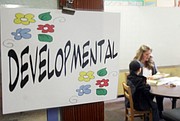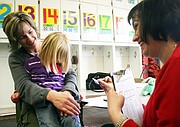Round 'em up
Before a child enters kindergarten and begins a childhood full of standardized education their intellectual development can vary as much as there are theories for parents to hasten that development.
Before a child enters kindergarten and begins a childhood full of standardized education their intellectual development can vary as much as there are theories for parents to hasten that development.
Whether they have a weakness for the alphabet or numbers, Plains Elementary wants to make sure everybody is prepared for that first year of school.
"It's as simple as knowing numbers, the alphabet or going all the way to tracing, drawing figures," Elementary Principal Jim Holland explained. "Any type of preparation we can give kids as to what's coming next year is beneficial for everybody: parents, students and teachers."
That is what the kindergarten roundup is for as pre-school children undergo a preliminary screening that covers everything from physical and speech development, hearing and eyesight and even making sure the children are up to date on their shots.
After the screening, the school then shares the results with the parents of the children so they can work with their child, so that they will be fully prepared for that first big step into the classroom.
Not only can four or five year olds sign up for the screening, but parents can sign up their children at any age if they suspect they may have a learning disability. In that case the key, Speech Therapist Denise Booth says, is finding it early.
"I've seen children at three who you couldn't understand anything they said and by the time they reach kindergarten you never knew they had a problem and that's a perfect success," Booth said.
Children, ages three and up, who have a learning disability qualify for assistance from a public school like Plains while any children younger than that would need to travel to a place like the Child Development Center in Missoula.
Beside the screening, the roundup also gives the schools a chance to gather a rough count of how many students will be attending next year, which will determine whether the school will have one or two kindergarten classes.
This year, 32 children signed up for the roundup, the most ever in Holland's tenure as principal making two classes seem likely even though Holland expects a few students to end up attending Paradise Elementary.
If the school did end up having a down year and had to switch to only one class Holland would then have to undergo the task of shuffling around teachers in the school system.
The high sign up total is also helpful for the school in terms of funding as each child brings about $5,000 of government assistance to the school.
In the last four years the Elementary has been down 15-20 students, mostly due to small third and fourth grade classes that boast only 21 and 23 students, while the rest of the classes are staying strong at around 30 students each.
Government funding is based on a three year average in the school, so one large class will not immediately alter the financial outlook of the school even though Holland says the more students coming to school helps.
"Having good numbers helps with funding. The more kids you have the more funding," Holland said.









